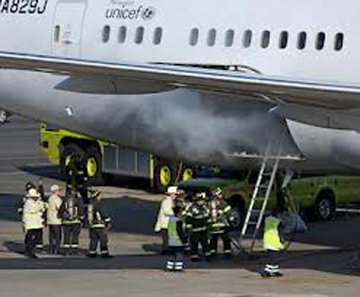
| Monday, February 04, 2013 | Archives | Advertise | Online Buyer's Guide |
Boeing’s Battery Problems Could Short-Circuit Battery Car Market
 The Boeing 787 Dreamliner is the first commercial jet to make heavy use of lithium-ion power. The ongoing investigation of faulty lithium-ion power packs on the new 787 Dreamliner could have implications far beyond the aerospace industry, with some observers worrying that Boeing’s battery problems could short-circuit the nascent market for plug-ins, hybrids, and other electrified automobiles. The Boeing 787 Dreamliner is the first commercial jet to make heavy use of lithium-ion power. The ongoing investigation of faulty lithium-ion power packs on the new 787 Dreamliner could have implications far beyond the aerospace industry, with some observers worrying that Boeing’s battery problems could short-circuit the nascent market for plug-ins, hybrids, and other electrified automobiles.Investigators in the U.S. and Japan have put a spotlight on the lithium backup power systems used on the new Boeing jet, linking the technology to several recent incidents, including a fire on one of the Dreamliners parked at a gate at Boston’s Logan field. Some observers are pointing to a series of fires involving the battery packs used in various electric vehicles. With the Boeing story getting a lot of airplay, "This is definitely an issue," said Joe Phillippi of AutoTrends Consulting. "This could be particularly bad timing," the analyst cautioned, considering the push to increase sales of battery-based vehicles in the years ahead. All 50 of the new jets Boeing had so far delivered have been grounded and investigators yesterday visited GS Yuasa, the Japanese manufacturer of the lithium batteries on the 787. While some aircraft have used the technology before, Boeing’s is the most advanced and extensive. One of two batteries involved in recent Dreamliner incidents shows signs of having been overcharged though the other did not, according to investigators. Several investigations continue into fires involving lithium-ion batteries involved in automotive applications. That includes a fire that destroyed a Fisker Karma plug-in hybrid parked in a Texas garage last year, and another involving Fiskers that were caught in flood waters during Superstorm Sandy last autumn. Several other battery based vehicles also caught fire in a storage lot at a port outside Newark, NJ, and it appears salt water short-circuited their electric systems. "No question, these kinds of headlines (surrounding the Boeing batteries) are not going to help battery vehicle sales," contends analyst Phillippi and others. Even without such concerns, the auto industry has struggled to boost demand for the high-mileage technology. Nissan, which also has struggled to meet expectations for its Leaf battery-electric vehicle, or BEV, last week announced it would introduce a new version that comes in $6,000 below the price tag of the 2012 model. With various state and federal incentives, the maker announced, some buyers could purchase the Leaf for less than $20,000. |
 |
NAFA Fleet Management Association 125 Village Blvd., Suite 200 Princeton, NJ 08540 Telephone: 609.720.0882 Fax: 609.452.8004 |






